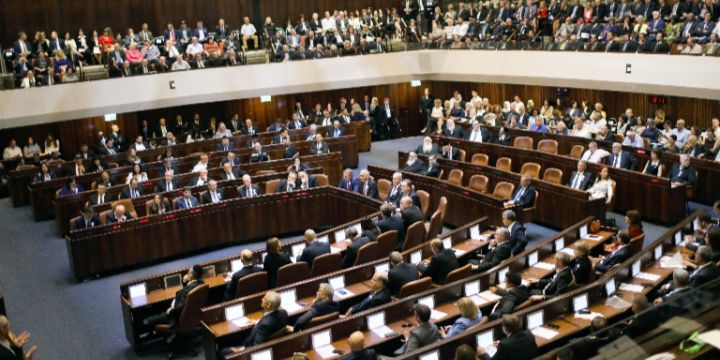
A general view of the first session of the 22nd Israeli parliament (Knesset). The Israeli parliament was officially handed the difficult task of forming a coalition government, setting the clock for lawmakers to attempt to avert yet another election. Photo: Ilia Yefimovich / dpa via Reuters.
As the daughter of an Ashkenazi mother and Mizrahi father, I discovered that a Mizrahi-Ashkenazi rift existed when my mother informed me that a portion of her family ceased contact after hearing that she married “an Arab.”
During summers spent in Israel, I was given a crash course in Israeli politics courtesy of my uncles, whose devotion to Likud stretched back to 1977 when Menachem Begin (leader of Herut, Likud’s precursor) was elected Prime Minister of Israel. Mizrahim helped catapult Begin to power, and he is still considered one of the greatest Jewish statesmen of our time.
Today, Mizrahim account for approximately half of Israel’s electorate, and are one of Likud’s most loyal base of voters. Despite legal obstacles and the emergence of the “anyone but Bibi” Yamina and New Hope movements, Prime Minister Netanyahu won a 30 seat plurality following the March 23rd election. With Naftali Bennett at the helm, Yamina garnered seven seats, while Gideon Sa’ar’s New Hope came away with six.
Israel’s President Reuven Rivlin tasked Netanyahu with forming a government based on the recommendation from 52 of the Knesset’s 120 newly elected members. If Bennett and Sa’ar table their goal of preventing Netanyahu from another term in office — and allocate their seats to Likud — Netanyahu would surpass the 61 seat threshold needed to form a government.
Related coverage

April 9, 2021 11:53 am
Whatever the outcome, depriving Netanyahu of the seats required to form a government may run contrary to Mizrahi voting preferences. Many still remain steadfast supporters of Likud, whose pendulum has yet to swing below 30 seats following the fourth election in two years. Likud also continues to punch above its weight in development towns, home to 25% of Israelis and a large swath of working class Mizrahi voters.
Mizrahi influence in Israel’s political arena is also aided by a weakened Israeli left. When cobbled together, Israel’s center-left parties control 45 seats following the March 23rd election, with Yair Lapid’s Yesh Atid winning 17 seats. If Netanyahu fails to form a government, Lapid is hoping to receive the second mandate from President Rivlin. Despite a deep political divide between the two men, Lapid has met with Bennett to discuss forming a coalition based on a rotational Prime Ministership.
The center-left’s espousal of egalitarian and liberal ideals is also discomfiting to the more traditional Mizrahi voter. Their attempt to attract Mizrahim to their ranks fell flat in 2020, when, under the leadership of Moroccan born Minister of Economy Amir Peretz, Labor had its worst “showing for a party that ruled Israel for the first 30 years.” It fared better this year, but not by that much.
Mizrahi fealty to Likud coupled with the recent normalization agreements between Israel and her Arab neighbors is also helping fuel a sea change in Arab attitudes towards the Israeli right. The head of the conservative Islamist Arab Ra’am party, Mansour Abbas, signaled his willingness to serve in a Likud led government. While Ra’am’s four seats may prove crucial in providing Netanyahu a 61 seat mandate, their inclusion is supported by less than half of Israelis, and has invoked the anger of the far-right Religious Zionist Party and Noam. Israeli reticence to fully embrace Ra’am is understandable given Abbas’ affiliation with Israel’s Islamic Movement and people associated with Palestinian terrorism. And Ra’am’s own charter also labels Zionism as racist.
Conventional wisdom assumes that an Arab party would find its home on the political left, rather than the right. Yet Likud’s popularity among Mizrahim helps make it a palatable base for Israeli Arabs. In an interview with Matti Friedman for The New York Times, Likud loyalist Amir Ohana — son of Moroccan born parents and currently serving as Minister of Public Security — lent credence to a rapprochement between the Mizrahi right and Israeli Arabs. Ohana said, “I grew up in a culture with great respect for the East — the tunes, the tastes, the culture — and it taught me to respect Arabs and not patronize them.”
As Evelyn Gordon notes in Commentary, prior to Begin, “Mizrahim were systematically excluded from the higher ranks of government, academia, and any other institution affiliated with the state, all of which were dominated by Ashkenazi Jews.”
Since the 1970s, Israel has made great strides in ensuring equality among all its citizens. Gordon notes that today, Mizrahim are “routinely represented in the highest ranks of government and government institutions.” And according to a study conducted by Professor Momi Dahan in 2013, the percentage of Mizrahi “20-29 year olds enrolled in higher education doubled between 1995-96 and 2006-2007.” Similarly, the number of Arab Israelis receiving their bachelor’s degree in 2018 accounted for 17% of all undergraduate students — doubling the number of Arabs enrolled in higher education in almost a decade.
Mizrahi loyalties are enabling Likud to continue squeaking past political opponents, while also attracting other minority groups to its flank. And with a warm peace between Israel and her Arab neighbors, Mizrahim will likely play an even greater role in Israeli society.
Whether reluctant partnerships or personal animus will characterize the formation of the next government is unknown. And while policy priorities and fresh alliances may crack the current political stalemate, Mizrahi voting patterns are unlikely to stray. Rather, their allegiance and growing influence may usher in a fifth election.
Irit Tratt is a freelance writer and pro-Israel advocate who resides in New York
Related posts:
Views: 0
 RSS Feed
RSS Feed















 April 10th, 2021
April 10th, 2021  Awake Goy
Awake Goy  Posted in
Posted in  Tags:
Tags: 
















